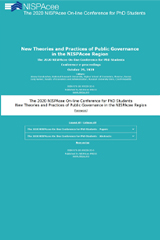The permanent Working Group on Politico-Administrative Relations was created at the 1998 NISPAcee conference in Prague. For its future development and the forthcoming 11th Annual NISPAcee conference in Bucharest, 2003, the group aims to broaden the conceptual dimension of its research focus.
To date the group has analysed the roles of the principal actors in the public policy process - politicians and civil servants - generally through the application of 'Western models' for categorisation and comparative assessment of politico-administrative relations in the region. One of the key lessons learned in the employment of these studies is the difficulty of satisfactorily applying models of politico-administrative theory that are conceived in the West in CEE states. Hence, for the forthcoming year it is proposed that the group orient its focus away from the application of abstract and descriptive models and concentrate on analysing empirical evidence through case study methodology.
Call for papers
The study of the traditional dichotomy of politico-administrative relations in CEE states will be widened to incorporate and analyse the process of modernising governance in the region. The contemporary focus on governance can be understood in part as a response to the challenge of governing complex and fragmented societies, and the difficulties faced by the state in attempting to solve complex and intractable social problems through direct forms of intervention. Governance has become an umbrella concept for a wide variety of empirical phenomena about governing. Governance highlights the role of the state in 'steering' action within complex social systems (Kooiman, 1993). It signifies a set of elusive but potentially deeply significant shifts in the way in which government seeks to govern (Pierre and Peters, 2000), primarily in involving a wider array of social actors in making and implementing policy.
In addition to the traditional focus on relations between the principal actors - politicians and civil servants, the concept of governance implies the presence, impact of, necessity and contribution of a variety of other actors in the policy-making arena. It may be argued that in the case of Central and Eastern Europe the development of channels, access and the legitimate roles of these actors are weak. This, in turn, impacts negatively upon the institutionalisation of public policies in CEE countries and capacities to govern, given that traditional devices of political, as well as administrative, responsibility and accountability do not optimally work in the region. Broadening the conceptual focus of the working group, and encompassing the plurality of interdependent institutions and actors in the policy making process may significantly contribute to the analysis of how new patterns of governance are being formed in CEE states. This change retains our focus on the interactions of politics and administration, but motivates us to examine a wider range of political phenomena and actors.
The central aim of the proposed studies is the analysis of basic channels and forms of government - society interaction (consultations, participation, feedback, impact, capture, manipulation etc.) in the policy process and the diverse and multiple stakeholders who, in various roles and with differing levels of intensity, are involved in such interaction. The development of a typology or models of these channels, forms and stakeholders is not being proposed at present but rather to firstly attempt to identify several crucial variables, and some configurations of interaction among the actors involved in governance.
For example, we will attempt to identify:
- variables that support and hinder different forms of interaction
- the role of politicians/ civil servants in developing/ restraining these interactions and balancing them
- changes in the mechanisms of accountability with the emergence of new inputs and impacts etc.
At this initial stage of development papers should be approached through a case study analysis of key policy areas which will also demonstrate the differences and variation in national approaches to policy making, as well as differences among the policy areas. The selected areas are:
Sectoral:
- social/welfare
- economic
- environment
- defence (process of approaching to the NATO)
- EU affairs (accession process)
- taxation




 Price:
Price: 









